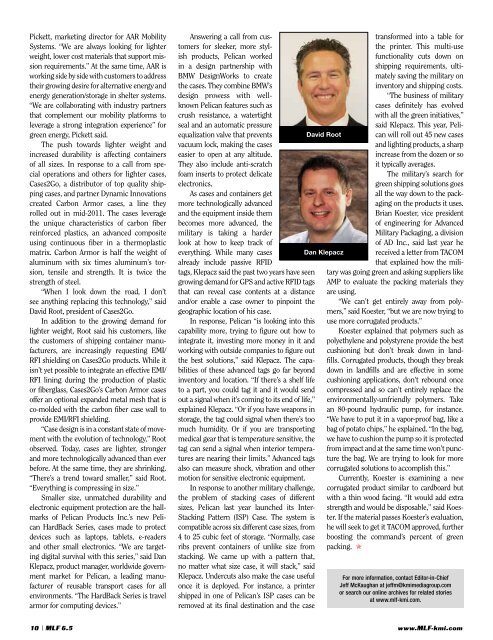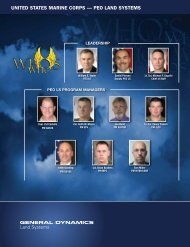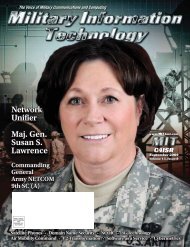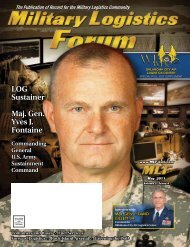Defense logistics agency issue - KMI Media Group
Defense logistics agency issue - KMI Media Group
Defense logistics agency issue - KMI Media Group
You also want an ePaper? Increase the reach of your titles
YUMPU automatically turns print PDFs into web optimized ePapers that Google loves.
Pickett, marketing director for AAR Mobility<br />
Systems. “We are always looking for lighter<br />
weight, lower cost materials that support mission<br />
requirements.” At the same time, AAR is<br />
working side by side with customers to address<br />
their growing desire for alternative energy and<br />
energy generation/storage in shelter systems.<br />
“We are collaborating with industry partners<br />
that complement our mobility platforms to<br />
leverage a strong integration experience” for<br />
green energy, Pickett said.<br />
The push towards lighter weight and<br />
increased durability is affecting containers<br />
of all sizes. In response to a call from special<br />
operations and others for lighter cases,<br />
Cases2Go, a distributor of top quality shipping<br />
cases, and partner Dynamic Innovations<br />
created Carbon Armor cases, a line they<br />
rolled out in mid-2011. The cases leverage<br />
the unique characteristics of carbon fiber<br />
reinforced plastics, an advanced composite<br />
using continuous fiber in a thermoplastic<br />
matrix. Carbon Armor is half the weight of<br />
aluminum with six times aluminum’s torsion,<br />
tensile and strength. It is twice the<br />
strength of steel.<br />
“When I look down the road, I don’t<br />
see anything replacing this technology,” said<br />
David Root, president of Cases2Go.<br />
In addition to the growing demand for<br />
lighter weight, Root said his customers, like<br />
the customers of shipping container manufacturers,<br />
are increasingly requesting EMI/<br />
RFI shielding on Cases2Go products. While it<br />
isn’t yet possible to integrate an effective EMI/<br />
RFI lining during the production of plastic<br />
or fiberglass, Cases2Go’s Carbon Armor cases<br />
offer an optional expanded metal mesh that is<br />
co-molded with the carbon fiber case wall to<br />
provide EMI/RFI shielding.<br />
“Case design is in a constant state of movement<br />
with the evolution of technology,” Root<br />
observed. Today, cases are lighter, stronger<br />
and more technologically advanced than ever<br />
before. At the same time, they are shrinking.<br />
“There’s a trend toward smaller,” said Root.<br />
“Everything is compressing in size.”<br />
Smaller size, unmatched durability and<br />
electronic equipment protection are the hallmarks<br />
of Pelican Products Inc.’s new Pelican<br />
HardBack Series, cases made to protect<br />
devices such as laptops, tablets, e-readers<br />
and other small electronics. “We are targeting<br />
digital survival with this series,” said Dan<br />
Klepacz, product manager, worldwide government<br />
market for Pelican, a leading manufacturer<br />
of reusable transport cases for all<br />
environments. “The HardBack Series is travel<br />
armor for computing devices.”<br />
10 | MLF 6.5<br />
Answering a call from customers<br />
for sleeker, more stylish<br />
products, Pelican worked<br />
in a design partnership with<br />
BMW DesignWorks to create<br />
the cases. They combine BMW’s<br />
design prowess with wellknown<br />
Pelican features such as<br />
crush resistance, a watertight<br />
seal and an automatic pressure<br />
equalization valve that prevents<br />
vacuum lock, making the cases<br />
easier to open at any altitude.<br />
They also include anti-scratch<br />
foam inserts to protect delicate<br />
electronics.<br />
As cases and containers get<br />
more technologically advanced<br />
and the equipment inside them<br />
becomes more advanced, the<br />
military is taking a harder<br />
look at how to keep track of<br />
everything. While many cases<br />
already include passive RFID<br />
tags, Klepacz said the past two years have seen<br />
growing demand for GPS and active RFID tags<br />
that can reveal case contents at a distance<br />
and/or enable a case owner to pinpoint the<br />
geographic location of his case.<br />
In response, Pelican “is looking into this<br />
capability more, trying to figure out how to<br />
integrate it, investing more money in it and<br />
working with outside companies to figure out<br />
the best solutions,” said Klepacz. The capabilities<br />
of these advanced tags go far beyond<br />
inventory and location. “If there’s a shelf life<br />
to a part, you could tag it and it would send<br />
out a signal when it’s coming to its end of life,”<br />
explained Klepacz. “Or if you have weapons in<br />
storage, the tag could signal when there’s too<br />
much humidity. Or if you are transporting<br />
medical gear that is temperature sensitive, the<br />
tag can send a signal when interior temperatures<br />
are nearing their limits.” Advanced tags<br />
also can measure shock, vibration and other<br />
motion for sensitive electronic equipment.<br />
In response to another military challenge,<br />
the problem of stacking cases of different<br />
sizes, Pelican last year launched its Inter-<br />
Stacking Pattern (ISP) Case. The system is<br />
compatible across six different case sizes, from<br />
4 to 25 cubic feet of storage. “Normally, case<br />
ribs prevent containers of unlike size from<br />
stacking. We came up with a pattern that,<br />
no matter what size case, it will stack,” said<br />
Klepacz. Undercuts also make the case useful<br />
once it is deployed. For instance, a printer<br />
shipped in one of Pelican’s ISP cases can be<br />
removed at its final destination and the case<br />
David Root<br />
Dan Klepacz<br />
transformed into a table for<br />
the printer. This multi-use<br />
functionality cuts down on<br />
shipping requirements, ultimately<br />
saving the military on<br />
inventory and shipping costs.<br />
“The business of military<br />
cases definitely has evolved<br />
with all the green initiatives,”<br />
said Klepacz. This year, Pelican<br />
will roll out 45 new cases<br />
and lighting products, a sharp<br />
increase from the dozen or so<br />
it typically averages.<br />
The military’s search for<br />
green shipping solutions goes<br />
all the way down to the packaging<br />
on the products it uses.<br />
Brian Koester, vice president<br />
of engineering for Advanced<br />
Military Packaging, a division<br />
of AD Inc., said last year he<br />
received a letter from TACOM<br />
that explained how the military<br />
was going green and asking suppliers like<br />
AMP to evaluate the packing materials they<br />
are using.<br />
“We can’t get entirely away from polymers,”<br />
said Koester, “but we are now trying to<br />
use more corrugated products.”<br />
Koester explained that polymers such as<br />
polyethylene and polystyrene provide the best<br />
cushioning but don’t break down in landfills.<br />
Corrugated products, though they break<br />
down in landfills and are effective in some<br />
cushioning applications, don’t rebound once<br />
compressed and so can’t entirely replace the<br />
environmentally-unfriendly polymers. Take<br />
an 80-pound hydraulic pump, for instance.<br />
“We have to put it in a vapor-proof bag, like a<br />
bag of potato chips,” he explained. “In the bag,<br />
we have to cushion the pump so it is protected<br />
from impact and at the same time won’t puncture<br />
the bag. We are trying to look for more<br />
corrugated solutions to accomplish this.”<br />
Currently, Koester is examining a new<br />
corrugated product similar to cardboard but<br />
with a thin wood facing. “It would add extra<br />
strength and would be disposable,” said Koester.<br />
If the material passes Koester’s evaluation,<br />
he will seek to get it TACOM approved, further<br />
boosting the command’s percent of green<br />
packing. O<br />
For more information, contact Editor-in-Chief<br />
Jeff McKaughan at jeffm@kmimediagroup.com<br />
or search our online archives for related stories<br />
at www.mlf-kmi.com.<br />
www.MLF-kmi.com
















